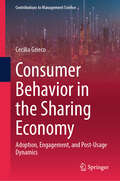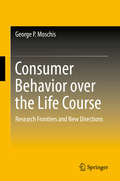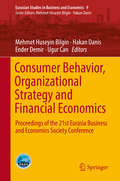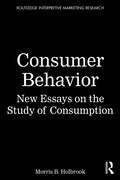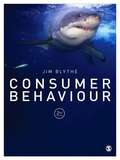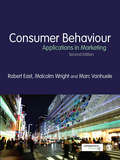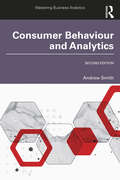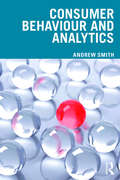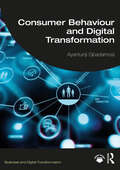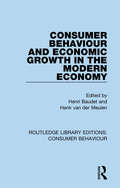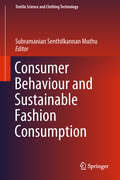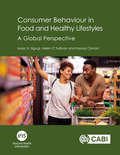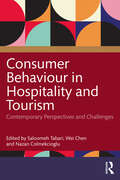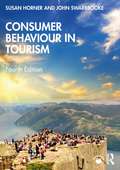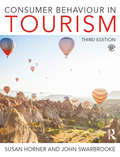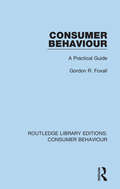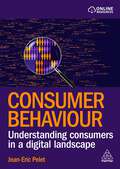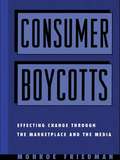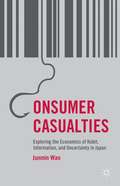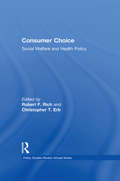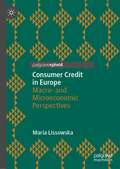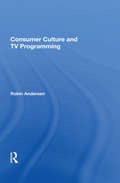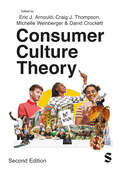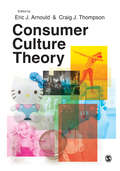- Table View
- List View
Consumer Behavior in the Sharing Economy: Adoption, Engagement, and Post-Usage Dynamics (Contributions to Management Science)
by Cecilia GriecoThe book examines the essential aspects of consumer behavior within the sharing economy. This thorough analysis covers the pre-adoption, active usage, and post-adoption phases, offering a comprehensive view of the consumer journey. The research is based on an extensive literature review, highlighting key elements and emphasizing the consumer perspective through original quantitative and qualitative studies across various industries. Researchers will find the theoretical advancements and cutting-edge insights invaluable. Platform managers will gain a deeper understanding of consumer behavior, enabling them to refine strategies throughout the purchasing process. Marketing professors can use this book as a primary textbook or supplementary reading for their courses. Key topics include the drivers of adoption, trust issues, satisfaction, and user retention, along with theoretical frameworks that uniquely define the phenomenon of the sharing economy and the specificities of consumer behavior within this domain.
Consumer Behavior over the Life Course: Research Frontiers and New Directions
by George P. MoschisThis book examines consumer behavior using the “life course” paradigm, a multidisciplinary framework for studying people's lives, structural contexts, and social change. It contributes to marketing research by providing new insights into the study of consumer behavior and illustrating how to apply the life course paradigm’s concepts and theoretical perspectives to study consumer topics in an innovative way.Although a growing number of marketing researchers, either implicitly or explicitly, subscribe to life course perspectives for studying a variety of consumer behaviors, their efforts have been limited due to a lack of theories and methods that would help them study consumers over the lifecycle. When studying consumers over their lifespan, researchers examine differences in the consumer behaviors of various age groups (e.g., children, baby boomers, elderly, etc.) or family life stages (e.g., bachelors, full nesters, empty nesters, etc.), inferring that consumer behavior changes over time or linking consumption behaviors to previous experiences and future expectations. Such efforts, however, have yet to benefit from an interdisciplinary research approach. This book fills this gap in consumer research by informing readers about the differences between some of the most commonly used models for studying consumers over their lifespan and the life course paradigm, and providing implications for research, public policy, and marketing practice.Presenting applications of the life course approach in such research topics as decision making, maladaptive behaviors (e.g., compulsive buying, binge eating), consumer well-being, and cognitive decline, this book is beneficial for students, scholars, professors, practitioners, and policy makers in consumer behavior, consumer research, consumer psychology, and marketing research.
Consumer Behavior, Organizational Strategy and Financial Economics: Proceedings Of The 21st Eurasia Business And Economics Society Conference (Eurasian Studies in Business and Economics #9)
by Mehmet Huseyin Bilgin Hakan Danis Ender Demir Ugur CanThis volume presents selected articles from the 21st Eurasia Business and Economics Society (EBES) Conference, which was held in Budapest (Hungary) in 2017. The theoretical and empirical papers in this volume cover various areas of business, economics, and finance from a diverse range of regions. In particular, this volume focuses on the latest trends in consumer behavior, new questions in the development of organizational strategy, and the interaction of financial economics with industrial economics and policy.
Consumer Behavior: New Essays on the Study of Consumption (Routledge Interpretive Marketing Research)
by Morris B. HolbrookConsumer Behavior presents an autobiographical view of Morris B. Holbrook’s contributions to the study of consumer behavior, describing his life and work over the past 60 years via a collection of subjective personal introspective essays. This new collection extends, enlarges, and elaborates on the insights garnered over Holbrook’s career to provide a lively and thought-provoking exploration of the evolution of consumer research.Using Subjective Personal Introspection (SPI), Holbrook shares aspects of his own journey in developing insights into such topics as the consumption experience, consumer value, the jazz metaphor, marketing education, and various controversies that have interested the scholarly community. Early chapters portray Holbrook’s evolution in college, graduate school, and faculty membership, while later chapters trace his approaches to understanding the role of consumption as the essence of the human condition. Throughout, SPI is used to illuminate the ways in which academic struggles have led toward deeper understandings of consumers.Readers with an interest in the autobiographical details of how ideas develop and emerge in an area such as consumer research – including doctoral students or faculty members in the field of marketing – will find enlightenment and inspiration in contemplating the (mis)adventures of a fellow traveler.
Consumer Behaviour
by Jim BlytheWhy do you choose the things you buy – such as this textbook, a smartphone or an item of clothing? How often, where, and instead of what? What do you consider a boring necessity or a fun luxury? What do you do with products once you’ve purchased them? When do you decide to chuck them and why?<P> As a consumer you make conscious and unconscious decisions, nonstop, every day of your life. This is Consumer Behaviour!<P> This friendly, lively full colour text will support you through your course and help you to get the best possible grade for future employment. It even has How to Impress Your Examiner boxes in each chapter. There are lots of case studies along the way from global brands such as Facebook, Apple and Amazon Kindle, and Consumer Behaviour in Action boxes in every chapter to show you how it works in the real world.<P> If you want to be top of the class you can push yourself that little bit further by reading the Challenging the Status Quo asides which will help your critical thinking and problem solving skills. These are key skills that employers look for in graduates, so practicing now will help set you apart from the pack and boost your employability. You could also dip into the Further Reading resources to help you with essays and exam revision – using these is a sure route to better grades.<P> Visit the companion website www.sagepub.co.uk/blythe for extra materials including multiple choice questions to test yourself and Jim’s pick of Youtube videos that make the examples in each chapter come alive!
Consumer Behaviour
by Robert East Malcolm Wright Marc VanhueleWhat's the best day to advertise groceries? Does a lookalike damage the brand it mimics? Do your long-term customers recommend you more than others? How damaging is negative word of mouth? Should retailers use 9-ending prices? These are some of the fascinating questions you will explore in this text.<P> The text is written by respected marketing academics across the globe with a strong focus on the use of research to help higher-level students develop analytical and evidence-based thinking in marketing. It extends beyond a psychological approach to provide an empirical understanding of the subject for success in industry roles or further research in the field, and takes into consideration not just the individual but the market environment.<P> New to this second edition:<P> - Fully updated with contemporary, global examples and case studies to encourage an international readership<P> - Further coverage of cross-cultural comparison, including a new chapter on Consumer Differences which also incorporates age and gender differences<P> - Study features such as exercises, questions/answers, and a fully updated companion website with lecturer and student resources - www.sagepub.co.uk/east2e <P> This textbook is essential reading for postgraduate students (MA, MSc, MBA) taking courses in consumer behaviour and undergraduate students specialising in consumer behaviour.<P>
Consumer Behaviour and Analytics (Mastering Business Analytics Ser.)
by Andrew SmithThe second edition of Consumer Behaviour and Analytics provides a consumer behaviour textbook for the new marketing reality. In a world of Big Data, machine learning and artificial intelligence, this key text reviews the issues, research and concepts essential for navigating this new terrain. It demonstrates how we can use data-driven insight and merge this with insight from extant research to inform knowledge-driven decision-making. Adopting a practical and managerial lens, while also exploring the rich lineage of academic consumer research, this textbook approaches its subject from a refreshing and original standpoint. It contains numerous accessible examples, scenarios and exhibits, and condenses the disparate array of relevant work into a workable, coherent, synthesized and readable whole. Providing an effective tour of the concepts and ideas most relevant in the age of analytics-driven marketing (from data visualization to semiotics), the book concludes with an adaptive structure to inform managerial decision-making. Consumer Behaviour and Analytics provides a unique distillation from a vast array of social and behavioural research merged with the knowledge potential of digital insight. It offers an effective and efficient summary for undergraduate, postgraduate or executive courses in consumer behaviour and marketing analytics, and also functions as a supplementary text for other marketing modules. Online resources include PowerPoint slides.
Consumer Behaviour and Analytics: Data Driven Decision Making
by Andrew SmithConsumer Behaviour and Analytics provides a consumer behaviour textbook for the new marketing reality. In a world of Big Data, machine learning and AI, this key text reviews the issues, research and concepts essential for navigating this new terrain. It demonstrates how we can use data-driven insight and merge this with insight from extant research to inform knowledge-driven decision making. Adopting a practical and managerial lens, while also exploring the rich lineage of academic consumer research, this textbook approaches its subject from a refreshing and original standpoint. It contains numerous accessible examples, scenarios and exhibits and condenses the disparate array of relevant work into a workable, coherent, synthesized and readable whole. Providing an effective tour of the concepts and ideas most relevant in the age of analytics-driven marketing (from data visualization to semiotics), the book concludes with an adaptive structure to inform managerial decision making. Consumer Behaviour and Analytics provides a unique distillation from a vast array of social and behavioural research merged with the knowledge potential of digital insight. It offers an effective and efficient summary for undergraduate, postgraduate or executive courses in consumer behaviour and marketing analytics or a supplementary text for other marketing modules.
Consumer Behaviour and Digital Transformation (Business and Digital Transformation)
by Ayantunji GbadamosiThis comprehensive textbook explores how technological developments and emerging technologies impact on, and engage with, consumer behaviour and decision making globally. The book will enable readers to develop a coherent understanding of the basic underpinnings of consumer behaviour as they relate to individual and group-oriented consumption decisions, offering insight into how consumer behaviour, contemporary real-life situations, and digital technology are inextricably linked.Key learning objectives, exercises and activities, boxed examples and analytical frameworks facilitate and enrich students’ learning. Each chapter includes ‘pause, plan, and practice (PPP)’ activities, as well as real-life case studies exploring digital consumption, digital consumer experiences, and digital trends across industries, from global companies such as Nike and McDonald’s to the digital transformation of SMEs. Combining a thorough examination of traditional theory with a fresh approach to the impact of digital transformation on consumer behaviour, this textbook should be core reading for advanced undergraduate and postgraduate students studying Consumer Behaviour, Consumer Psychology, Customer Experience Management, and Digital Marketing.This book will be accompanied by online resources for the use of instructors, including PowerPoint slides and a test bank.
Consumer Behaviour and Economic Growth in the Modern Economy (Routledge Library Editions: Consumer Behaviour)
by Henri Baudet Henk van der MeulenThese essays show that industrialisation and fast economic growth have changed not only the broad material environment, but have also had a very important impact on basic food consumption. The introductory chapter takes a theoretical view and tries to establish the interrelationship between economic forces and social habits. The other contributors analyse how the experience of Europe, Japan and North America fit this general explanation and they demonstrate how cultural and regional differences have shaped the development of consumer behaviour and patterns of consumption over the last two centuries.
Consumer Behaviour and Sustainable Fashion Consumption (Textile Science and Clothing Technology)
by Subramanian Senthilkannan MuthuThis book analyses the importance of consumer behaviour in sustainable fashion and consumption. Consumer behaviour plays a major role in sustainability, and when it comes to textile products, a number of studies have shown that for certain product categories, consumer behaviour during use and disposal stages influences the entire life cycle impacts of the product more than the raw material and manufacturing stages. However green the production, the overall sustainability of a product depends on the consumers who use and dispose of it.
Consumer Behaviour in Food and Healthy Lifestyles: A Global Perspective
by Helen O'Sullivan Dr Isaac K Ngugi Dr Hanaa OsmanThis book is an essential resource exploring the concepts, theories and methods in consumer behaviour specifically applicable to the food and drink sector. Drawing examples from all continents, it provides you with accessible coverage and a truly global perspective of the particular characteristics of this industry. It offers clear explanations and applications of theoretical concepts, using specialised case studies and examples; features an introduction, learning objectives and summary in each chapter to hone your reading and revision; and provides you with companion online material including notes and self-assessment questions. This important new book is the perfect guide for students studying consumer behaviour or experience in food and drink as part of courses in agricultural or agribusiness management and economics, hospitality and tourism, business studies, food science and nutrition, or generic marketing and consumer studies.
Consumer Behaviour in Hospitality and Tourism: Contemporary Perspectives and Challenges
by Wei Chen Saloomeh Tabari Nazan ColmekciogluThis insightful and expert-led volume presents a holistic view of the latest, cutting-edge global research on trends and changes in consumer behaviour in hospitality and tourism, with focus on the effects of the COVID-19 pandemic and its impacts on purchase patterns within the industries.The COVID-19 pandemic has affected every aspect of consumer behaviour, including expenses, ways of shopping, eating, lifestyle, use of technology and individual decision-making processes. This volume presents a carefully selected and logically structured collection of chapters, which aim to identify the factors that influence these new purchase patterns and evaluate how managers, retailers and marketers can develop appropriate strategies that respond to these changes in the market going forward. This book explores the effects of multiple socio-economic factors on individual consumption behaviours and features an array of international case studies.This book is of pivotal interest for students, scholars and researchers interested in consumer behaviour within the tourism and hospitality industries, as well as providing a useful tool for professionals to develop appropriate strategies that meet the evolving needs of consumers in the market.
Consumer Behaviour in Tourism
by John Swarbrooke Susan HornerNow fully revised and updated, the fourth edition of this bestselling text provides students with a vital understanding of the nature of tourism and contemporary tourist behaviour. It also shows them how this knowledge can be used to manage and market tourism effectively in a variety of sectors of tourism including tour operations, hospitality, visitor attractions, transport, retail travel, cruising and airlines. This fourth edition has been updated to include: new material on the impact of Information Communication Technologies (ICT) developments in tourism including social media, AR and VR, the links between climate change, sustainability and tourist behaviour, and the impact of crises and natural disasters on tourism and the cruise industry thirty brand new international case studies about topical issues such as Airbnb, travel blogs, overtourism, Covid-19, the flight-shaming movement, wellness tourism, hunting and tourism, terrorism, dark tourism, the solo traveller, volunteer tourism, second home ownership, music festivals, pilgrimage tourism, film- and TV-induced tourism, and tourism in Antarctica new online resources including PowerPoint slides and a case archive. Each chapter features conclusions, discussion points, essay questions and exercises to help tutors direct student-centred learning and allow students to check their understanding of what they have read. This book is an invaluable resource for students studying tourism.
Consumer Behaviour in Tourism
by John Swarbrooke Susan HornerNow fully revised and updated, the third edition of this bestselling text provides students with a vital understanding of the nature of tourism and contemporary tourists behaviour in political, social and economic context and how this knowledge can be used to manage and market effectively in a variety of tourism sectors including: tourism operations, tourist destinations, hospitality, visitor attractions, retail travel and transport. This third edition has been updated to include: New material on the impacts of IT on research and marketing communications, the rise and influence of social media and virtual technology, the growth in the interest of sustainable tourism products including slow food, the experience economy and new consumer experiences including fulfilment. New international case studies throughout including growth regions such as the Middle East, Russia, Europe, China, India and Brazil. New companion website including Power point slides and a case archive. Each chapter features conclusions, discussion points and essay questions, and exercises, at the end, to help tutors direct student-centred learning and to allow the reader to check their understanding of what they have read. This book is an invaluable resource for students following tourism courses.
Consumer Behaviour: A Practical Guide (Routledge Library Editions: Consumer Behaviour)
by Gordon R. FoxallThis book is concerned with the application of the behavioural sciences, notably social psychology and sociology, to the study of consumer behaviour. The emphasis throughout is on making these sciences practical for the marketing manager by focusing on those aspects of consumer behaviour which prove useful for managerial decision-making. The introduction defines the scope of the book in these terms and outlines a model for the consumer buying process. The book conlcudes with detailed models of consumer choice.
Consumer Behaviour: Understanding Consumers in a Digital Landscape
by Jean-Eric PeletWith this textbook, students will learn the concepts, theories and processes of consumer behaviour and how to apply them in a digitalized and competitive business landscape. Consumer Behaviour combines theoretical underpinnings with real-world practice to provide comprehensive, up-to-date coverage of the subject. It explores how consumer behaviour has evolved with the impact of technology, personalization and sustainability on perception and decision-making. This textbook is ideal for postgraduate students taking modules on Consumer Behaviour as part of their Marketing degrees. Features include:- Chapters on the psychological and social dynamics of consumer behaviour and the scientific foundations of learning and memory in brand engagement.- Examination of the role of AR/VR and the metaverse in retail experiences, live streaming and voice commerce as well as quantum computing and the importance of good UX design.- Ethical considerations of the digital consumer landscape, including privacy and data concerns. - Learning outcomes, key terms, a glossary and exercise questions international examples throughout, to help develop critical thinking.
Consumer Boycotts: Effecting Change Through the Marketplace and Media
by Monroe FriedmanFirst published in 1999. Routledge is an imprint of Taylor & Francis, an informa company.
Consumer Casualties
by Junmin WanJunmin Wan takes a two prong approach to analysing this pressure in Japan in his new volume Consumer Casualties. He first clarifies the consumer preference for habit to identify useful approaches toward solving a number of economic issues, such as gambling and other addictive practices.
Consumer Choice: Social Welfare and Health Policy
by Robert F. Rich & Christopher T. Erb"The United States health care system is unique among those of other developed economies--most significantly because health care is not a legal right in the United States. Instead, it is considered an employee benefit and a privilege, unless one is over age 65 or of low income. The United States is the only developed country without some form of universal health care.Contributors to this volume represent an interdisciplinary group of academics, practitioners, and service delivery providers. The volume begins with a general examination of the politics of health and social welfare in the United States. It then focuses on the importance and role of consumers in the U.S. economy, and dilemmas associated with promoting consumer choice. It explores policy issues and challenges in three specific areas: controlling health care costs and protecting choice with respect to health care, the major challenges to informed choice in health care, and barriers to effective health care service delivery. Contributors explore changes and reforms that have been introduced within public and privately financed systems over the past ten years.Consumer Choice examines in a timely and efficient manner critical social and health policy issues--nationally and internationally--and the major challenges that face informed choice in health care and social policy. Policymakers, health care officials, and medical personnel in the United States and other countries will find this volume highly informative."
Consumer Credit in Europe: Macro- and Microeconomic Perspectives
by Maria LissowskaThis book provides a comprehensive outlook on the state and role of consumer credits in the European economy and households. It underlines the role of consumerism and digitalisation, in the framework of legislation. It covers two major turns in consumer credit evolution: the 2008 crisis and Covid pandemic. The first had socio-economic sources, the second one was an external event, but provoked important changes in consumer behaviour. Lockdowns deepened the preference for digital financial products. FinTech and BigData operators acquired broader opportunities with the development of distance services.These new financial services need adapted legislation. The recently published project of Consumer Credits Directive covers new means of communication, such as smartphones, and extends rules to new ways of crediting, like crowdfunding.Consumer credit availability changed the behaviour of households. The propensity of poorer households to save faded due to the ease of getting credit. However, financial insecurity during the Coronavirus pandemic made households limit credits and build precautionary savings.
Consumer Culture And Tv Programming (Critical Studies In Communication And In The Cultural Industries)
by Robin K AndersenProduct placement is now an integral part of what is considered the highest-quality fiction programming on television. Throughout the history of television, until now, direct product placement within fiction has not been a significant marketing strategy. This broadcasting/marketing configuration marks a another definitive step in the history of the commercialization of television. This book is an exploration of the interconnections between media economics and communication discourse. The recessionary, highly competitive economic environment of the 1980s, which affected networks, independent broadcasting, and the media industry in general, has been widely noted in the business pages of the national press. But the dramatic effects on programming wrought by the financial strategies of this period are yet to be understood. Marketing factors account for the heightened emphasis on programming environment during the 1980s. But what are the full implications of the practice of audience marketing and the creation of appropriate programming environments?
Consumer Culture Theory
by David Crockett Michelle F. Weinberger Eric J. Arnould Craig J. Thompson*NOW FULLY UPDATED AND EXPANDED WITH SIX NEW CHAPTERS* Over the past forty years, Consumer Culture Theory (CCT) has emerged as a distinctive field of study that synthesizes diverse subjects such as anthropology, cultural studies, marketing, political theory and sociology to provide new insights into consumers’ relationships to the marketplace and the influence of commercial action on culture. This book, edited by leading scholars in CCT, contains contributions by many of its leading researchers, and distills this interdisciplinary field into a concise accessible overview for students and early career researchers. It describes the key themes, concepts and theoretical areas of CCT; explains why they are useful in understanding consumption and marketplace phenomena; and shows how they can be applied to a wide range of research contexts. Drawing on real-world scenarios, reflective tasks and international case studies to help aid theoretical understanding and critical thinking, the text is designed to support a course in CCT, supplement related study, and guide undergraduate and postgraduate students in writing a CCT-related dissertation/thesis. It is the go-to text for anyone who is curious about, new to CCT, or looking for an integrative compendium of CCT research and its implications. Eric J. Arnould is Emeritus Professor of Marketing at the Aalto University Business School, Finland. Craig J. Thompson is the Churchill-Bascom Professor of Marketing at the University of Wisconsin-Madison, USA. David Crockett is Professor of Marketing at the University of Illinois Chicago, USA. Michelle F. Weinberger is Associate Professor at the Medill School of Journalism, Media, Integrated Marketing Communications at Northwestern University, Illinois, USA.
Consumer Culture Theory
by David Crockett Michelle F. Weinberger Eric J. Arnould Craig J. Thompson*NOW FULLY UPDATED AND EXPANDED WITH SIX NEW CHAPTERS* Over the past forty years, Consumer Culture Theory (CCT) has emerged as a distinctive field of study that synthesizes diverse subjects such as anthropology, cultural studies, marketing, political theory and sociology to provide new insights into consumers’ relationships to the marketplace and the influence of commercial action on culture. This book, edited by leading scholars in CCT, contains contributions by many of its leading researchers, and distills this interdisciplinary field into a concise accessible overview for students and early career researchers. It describes the key themes, concepts and theoretical areas of CCT; explains why they are useful in understanding consumption and marketplace phenomena; and shows how they can be applied to a wide range of research contexts. Drawing on real-world scenarios, reflective tasks and international case studies to help aid theoretical understanding and critical thinking, the text is designed to support a course in CCT, supplement related study, and guide undergraduate and postgraduate students in writing a CCT-related dissertation/thesis. It is the go-to text for anyone who is curious about, new to CCT, or looking for an integrative compendium of CCT research and its implications. Eric J. Arnould is Emeritus Professor of Marketing at the Aalto University Business School, Finland. Craig J. Thompson is the Churchill-Bascom Professor of Marketing at the University of Wisconsin-Madison, USA. David Crockett is Professor of Marketing at the University of Illinois Chicago, USA. Michelle F. Weinberger is Associate Professor at the Medill School of Journalism, Media, Integrated Marketing Communications at Northwestern University, Illinois, USA.
Consumer Culture Theory
by Professor Eric J. Arnould Professor Craig J. ThompsonOutlining the key themes, concepts and theoretical areas in the field, this book draws on contributions from prominent researchers to unravel the complexities of consumer culture by looking at how it affects personal identity, social interactions and the consuming human being. A field which is characterised as being theoretically challenging is made accessible through learning features that include case study material, critical reflection, research directions, further reading and a broad mix of the types of consumers and consumption contexts including emerging markets and economies. The structure of the book is designed to help students map the field in the way it is interpreted by researchers and follows the conceptual mapping in the classic Arnould & Thompson 2005 journal article. The book is organised into three parts - the Consumption Identity, Marketplace Cultures and the Socio-Historic Patterning of Consumption. Insight is offered into both the historical roots of consumer culture and the everyday experiences of navigating the contemporary marketplace. The book is supported by a collection of international case studies and real world scenarios, including: How Fashion Bloggers Rule the Fashion World; the Kendal Jenner Pepsi Commercial; Professional Beer Pong, Military Recruiting Campaigns, The World Health Organisation and the Corporatization of Education. The go-to text for anyone new to CCT or postgraduate students writing a CCT-related thesis.
